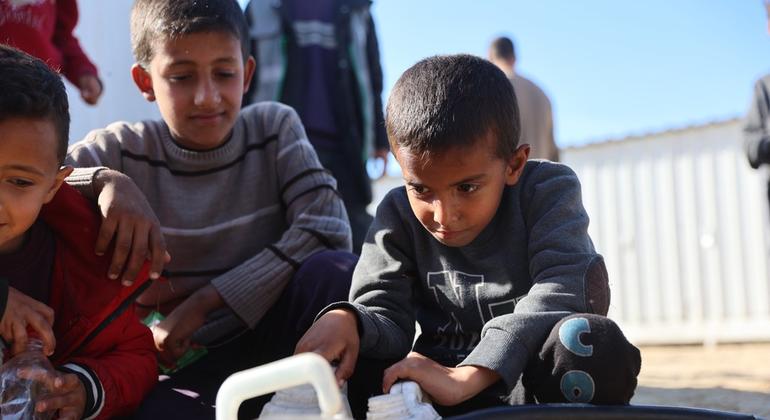UN officials launched assessment visits to Gaza and its agencies will resume night-time aid deliveries on Thursday after a 48-hour pause.
This after Israeli forces killed seven World Central Kitchen relief workers in a convoy delivering food in the enclave, where intense Israeli bombardment and ground operations continue.
“The situation in Gaza is disastrous,” World Health Organization (WHO) chief Tedros Adhanom Ghebreyesus said. “Once again, WHO demands a ceasefire. Once again, we call for all hostages to be released, and for lasting peace.”
UN Spokesperson Stéphane Dujarric said on Thursday that because of what happened to World Central Kitchen “we had to pause to regroup and reassess”, adding that a convoy will deployed tonight, “hopefully making it to the north”.
Top UN officials have been warning that famine looms in northern Gaza as Israel continues to block and delay aid entry, especially in the north.
To date, Israeli armed forces have killed more than 30,000 people in Gaza, according to local health authorities, in response to Hamas-led attacks on Israel in October that left almost 1,200 people dead and 240 taken hostage.
Aid and assessment missions
The UN Spokesperson said WHO teams reached two hospitals in Gaza City, carrying out assessments and delivering lifesaving supplies.
In addition, a WHO team reported dire conditions following Israel’s two-week-long siege of the Al-Shifa Hospital, he said.
The team spoke with patients who were able to leave the health facility after the siege, with one saying “doctors resorted to putting salt and vinegar on people’s wounds for lack of antiseptics, which are nonexistent,” Mr. Dujarric said.
“They described dire conditions during the siege, with no food, water or medicine available,” he said.
Grave humanitarian conditions
Almost six months into the war, humanitarian conditions are worsening, according to UN agencies on the ground.
On his way to Gaza on Thursday, Jamie McGoldrick, the UN’s Humanitarian Coordinator for the Occupied Palestinian Territory, reiterated that there is no safe place in the enclave.
The Occupied Palestinian Territory “has become one of the world’s most dangerous and difficult places to work”, he wrote on social media before his departure.
‘It can’t continue like this’
UN Women reported that Gazans have almost no access to water, food and healthcare while facing near constant bombardment.
“Every day the war in Gaza continues, at the current rate, an average of 63 women are killed,” the agency said, highlighting the struggles facing Palestinians, including Mayadah Tarazi, who works with the YWCA Palestine, a non-governmental organisation (NGO).
“The hope is for a ceasefire now,” Ms. Tarazi said. “We keep calling for ceasefire, but we need real action. We need the support from the governments to really push for the ceasefire because it can’t continue like this.”
Israel’s West Bank aggressions
Meanwhile, in the occupied West Bank, aggressions against Palestinians, their property and their land are being reported by UN agencies and news outlets.
The UN humanitarian relief agency, OCHA, reported demolitions taking place on Thursday in Umm ar Rihan.
Since 7 October and as of 1 April, 428 Palestinians, including 110 children, have been killed by Israeli forces across the West Bank, including East Jerusalem, of whom 131 were killed since the start of 2024.
In addition, nine were killed by Israeli settlers and three by either Israeli forces or settlers, according to the latest OCHA update.
During the same period, some 4,760 Palestinians have been injured, including at least 739 children, the majority by Israeli forces, the UN agency stated.
According to the Palestinian Prisoners Club, 11 Palestinians have additionally died in Israeli prisons since 7 October, mainly due to reported medical negligence or abuse, OCHA reported.
Human Rights Council to vote on Israeli sanctions
The 47-member UN Human Rights Council is poised to vote on several draft resolutions related to the war in Gaza on the final day of its current session in Geneva.
Drafts include one calling for an arms embargo on Israel, tabled on the heels of an Israeli drone-fired missile attack on three vehicles in an aid convoy that killed all seven World Central Kitchen passengers early this week in Gaza.
The convoy was delivering emergency food aid sailed in from Cyprus to stave off the looming famine in northern Gaza.
By provisions of the draft resolution, the Council would call on all States “to cease the sale, transfer and diversion of arms, munitions and other military equipment to Israel, the occupying Power, in order to prevent further violations of international humanitarian law and violations and abuses of human rights”.











